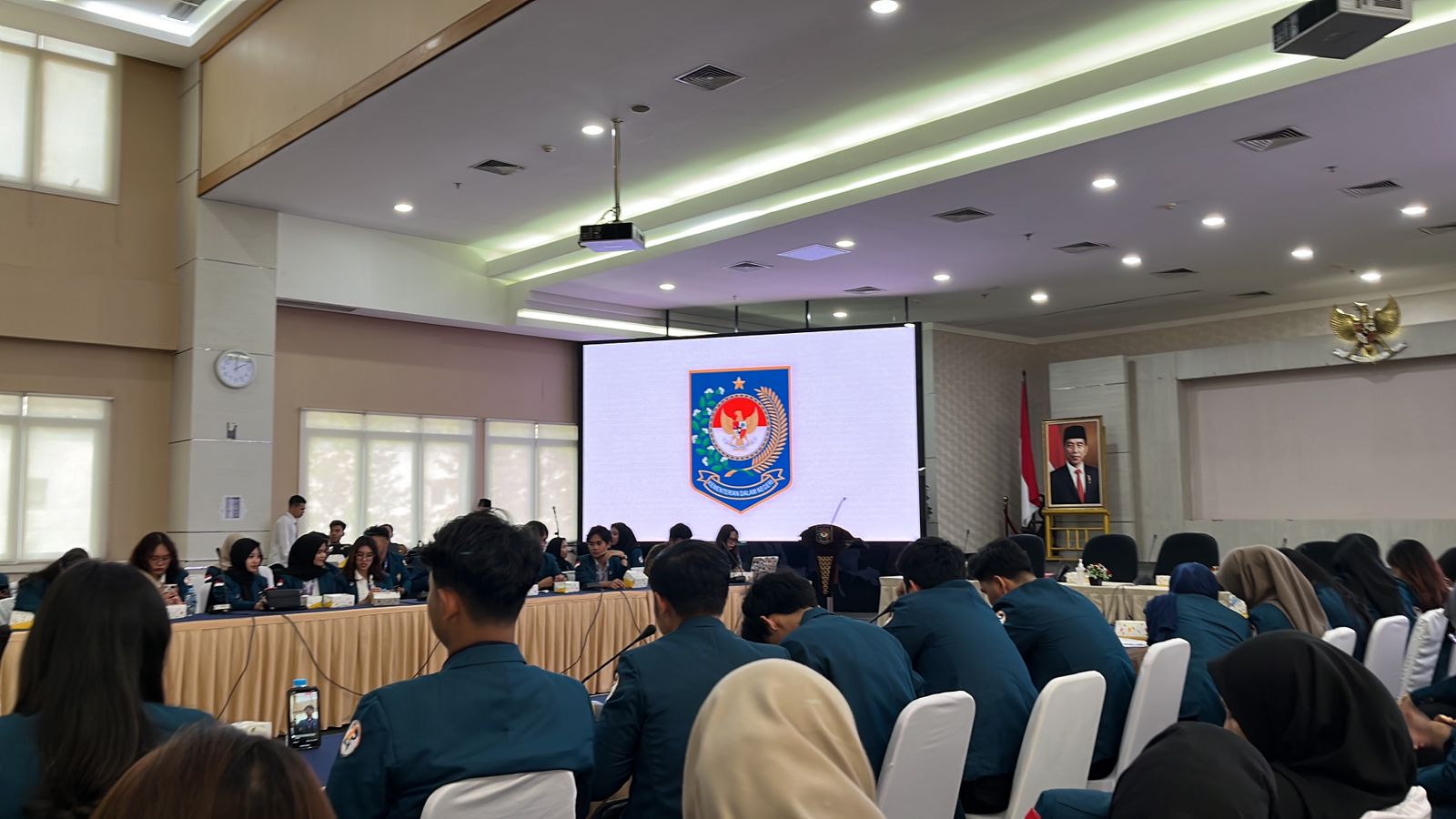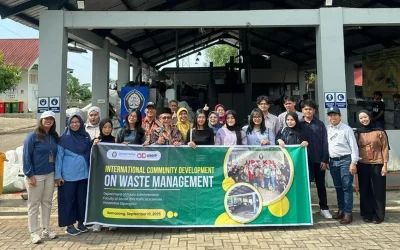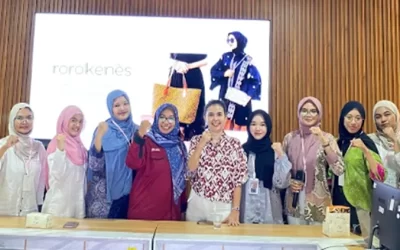Monday, June 24, 2024, the Public Administration Student Association visited the Ministry of Home Affairs in Jakarta. This visit is an initiative effort made by the Public Administration Student Association in order to carry out VIST DAY to develop the knowledge, insights, and experiences of Public Administration study program students. The visit to the VIST DAY 2024 event was also warmly welcomed by the Ministry of Home Affairs, represented by Mr. Aji Fauzi Faurza as the head of the Ministry of Home Affairs career development bureau. Mr. Aji Fauzi was also accompanied by Mr. Muhammad Laksmna Surya Adi Wibowo as Head of the Subdivision of Competency Assessment and Position Structuring at the Ministry of Home Affairs Personnel Bureau who would later become a speaker (resource person) on this visit.
The Ministry of Home Affairs is one of the government institutions in the form of a ministry in charge of domestic affairs as well as regional autonomy affairs. The reason for choosing the Ministry of Home Affairs as a target agency in order to develop students’ insights is because this institution has a fairly close relevance and relationship to the learning undertaken by Public Administration students in lectures. The scope of the Ministry of Home Affairs, including public policy is one of the main interests that underlies the choice of this institution as a means for expanding student knowledge.
In this visit, the group from the Public Administration Study Program Student Association consisted of various parties including lecturers who accompanied students on a visit to the Ministry of Home Affairs, namely Mr. Satria Aji Imawan, S.I.P., MPA and Mrs. Renata Jati Nirmala, S.IAN., MPA, Chairman and Vice Chairman of the Public Administration Student Association, Afdi Bintang Syabana and Muhammad Haykal Arraya, as well as all members of the public administration study program student association consisting of 8 departments.
Mr. Satria Aji Imawan as one of the accompanying lecturers who participated in the visit to the Ministry of Home Affairs said that this visit was expected to be utilized by all students present as a momentum to learn directly with practical methods and not just limited to theory as in lectures. Mr. Satria Aji Imawan also expects the participation of all students to be able to play an active role and recall the role of students as agents of change in accordance with the theme of the 2024 VIST DAY event with the theme “Empowering Leadership: Catalyzing Positive Change”. “I hope that all students can take advantage of this opportunity by asking questions that are relevant to the Ministry of Home Affairs as much as possible to increase the knowledge of all students such as regionalism and elections,” he said.
The event featured two speakers with two different topics, including government issues in this case the presence of the Ministry of Home Affairs as a party responsible for aspects of government, especially in the regional sector and Jakarta Governance after Law No. 2 of 2024 concerning the Special Region of Jakarta Province. The first resource person who gave a presentation was Mr. Muhammad Laksmna Surya Adi Wibawa with the topic of the presence of the Ministry of Home Affairs as a government agency that oversees government affairs. The Ministry of Home Affairs is one of three ministries stipulated in the 1945 Constitution of the Republic of Indonesia where the Ministry of Home Affairs holds the mandate if the president and vice president are simultaneously unable to carry out their duties. A state exists through four functions of government, namely service (to serve) to realize justice, development (to develop) to realize prosperity, empowerment (to empower) to realize independence, and regulation (to regulate) to realize order (regularity). In this case, the Ministry of Home Affairs has a regulatory function (to regulate) for local governments, namely supervising whether the local government has carried out its duties as it should and there are no deviations in the implementation of local government duties towards its autonomous regions in order to achieve order. The Ministry of Home Affairs monitors development plans in various sectors such as implementation and budgeting in order to achieve the planned goals.
In the presentation of the material, Mr. Laksamana as the resource person also mentioned that currently, Indonesia has entered an era where generation z dominates its presence. The era of z-generation dominance brings many changes in the governance system and public services. This is influenced by the existence of easily accessible access to technology, such as in social media, the public can easily see the performance of public services. The public is increasingly critical and the demands of public services are also increasingly difficult. Some aspects of current public service demands are that public services are required to be faster, smarter, cheaper, easier, and better. Facing the increasingly difficult public demands on the government, the Ministry of Home Affairs plays an important role in the decentralization process in this case, namely regulating local governments. Decentralization and OTDA that are expected in achieving the demands of public services include political decentralization or leader selection (elections are increasingly qualified and integrated, and the community is involved in policy making and implementation), administrative decentralization or authority (regions are getting better public services), fiscal decentralization (fiscally independent regions), and economic decentralization (regional economy is getting better with private involvement). All the decentralization and regional autonomy carried out is a way to achieve the welfare of the people. To achieve the success of this blood autonomy is the importance of the leadership of the regional head and his deputy and DPRD, the quality of the implementation of autonomy, and the control and control of the implementation of regional autonomy.
The second material presentation in the VISIT DAY activity was about Jakarta Governance after Law No. 2 of 2024 concerning the Special Province of Jakarta where this law is an amendment to Law Number 29 of 2007 concerning the Government of the Special Capital Region of Jakarta as the Capital of the Unitary State of the Republic of Indonesia. The second material was delivered by Ms. Irma Yuhanita. Law No. 2 of 2024 has a structure consisting of 12 chapters and 73 articles. It was conveyed that after the enactment of Law No. 2 of 2024 concerning the Special Capital Province on April 24, 2024, the special area of the capital city of Jakarta automatically switched to the province of the special area of Jakarta. The paradigm of this law is to establish Jakarta as a world-class city that is globally competitive by strengthening the economy and business for Jakarta through the listed authorities. In the presentation of the material, the differences between Law 29 of 2007 and Law No. 2 of 2024 were mentioned. Law No. 29 of 2007 aims to comprehensively regulate the governance of the province of Jakarta as the capital of the Republic of Indonesia and Law No. 2 focuses on strengthening Jakarta’s position as a world-class capital and further authority that focuses on the economy and business as well as sustainable and sustainable arrangements with surrounding areas. In the future, Jakarta will not stand alone, but there are functionally interconnected areas that will cooperate to build Jakarta into a world-class global city.
In addition to the mandate of the IKN Law, the urgency of changing Law No. 29 of 2007 concerning Jakarta as the capital of the Republic of Indonesia is caused by the need factor regarding the problems that come in Jakarta. These problems include flooding and the level that continues to arise from year to year when the rainy season comes, according to DKI BPbD data until 2022 there are around 200-300 neighbourhoods affected by flooding, if it continues to be left unchecked, it will have an impact on the economic cycle which will disrupt community mobility, damage community property and cause fatalities. The second problem is congestion, where according to the TomTom Traffic Index in 2023 Jakarta will be ranked 30th in the world for its level of congestion. In addition, Jakarta is positively the largest economic contributor to Indonesia, contributing 17.55% of the Indonesian economy according to data from BPS. When the capital moves to IKN, Jakarta will not have a significant impact on the economy in the sense that Jakarta will still be able to live. It is predicted that in 2015-2030 Jakarta will become a top 20 city in the world. Furthermore, there is a need to organize the Jabodetabekpunjur area where in the future Jakarta will be integrated with the surrounding area with functional linkages.
This session also explained the 12 chapters of Law No. 2 of 2024. In chapter 1 article 1 of Law No. 2 of 2004, important definitions, abbreviations or acronyms used in the decision are explained, as well as other general matters in the following articles. In chapter 2 articles 2-4, it is stated about the position and function of the special district province of Jakarta where the position of Jakarta has changed from DKI Jarta to the Jakarta Special Region, DKJ is a provincial autonomous region, and DKJ is positioned as a central and global economic center. The function of DKJ in this chapter is as a center of trade, service activities and financial services, as well as national, regional and global business activities. Chapter 3 articles 5-7 contain the boundaries and divisions of the DKJ area. Chapter 4 articles 8-16 explain the principles and structure of the DKJ government where the principle of government is carried out according to the principles of autonomy, the principle of deconcentration, and the principle of assistance and for the structure of government consists of the governor and DPRD which are assisted by regional apparatus. Then chapter 5 articles 17-18 contain city / district councils and village deliberative institutions. Chapter 6 articles 19-48 regulates government affairs and special authority where this chapter is the core of Law No. 2 2024 which contains 15 government affairs, special authority in institutions, supporting government affairs regarding staffing and regional finances, additional authority. Chapter 7 article 49 contains the domestic and foreign cooperation of DKJ. Chapter 8 contains the funding chapter where Jakarta can propose additional funding to carry out special powers such as Yogyakarta. Chapter 9, articles 51-60, discusses agglomeration areas consisting of 3 provinces including DKJ, 4 cities, and 5 regencies. Chapter 11 articles 62-68 contain transitional provisions. Finally, chapter 12, articles 69-73, discusses the closing provisions.
The amendment of Law Number 29 of 2007 concerning Jakarta as the State Capital of the Republic of Indonesia into Law Number 2 of 2024 changed the paradigm of Jakarta’s development. Previously, the regulation was focused on strengthening Jakarta’s position as the State Capital, with the new Law to strengthen Jakarta’s position as the World Economic Center and is projected to become a world-class city that will become a new economic node in the world. The powers delegated to the Jakarta Provincial Government are expected to be an “enabling factor” to strengthen Jakarta to become more independent and competitive without further interference from the central government. The continuity of planning between Jakarta and the surrounding areas is expected to be a model for other regions to integrate the continuity of arrangements for the advancement of Joint Development.
The visit of the Public Administration Student Association to the Ministry of Home Affairs during the Visiting Days 2024 activity has provided in-depth insight into the important role of government in managing domestic affairs and regional governance, especially in an era of rapid change and increasingly high public demands. Public Administration students of the Faculty of Social and Political Sciences, Diponegoro University gained a better understanding of decentralization, regional autonomy, and the challenges and opportunities in the governance of Jakarta after the change of status to the Special Region of Jakarta Province.
This activity not only enriches knowledge, but also provides an opportunity for students to see first-hand government practices and public policies that are significant to the study of Public Administration. The visit to the Ministry of Home Affairs is expected to inspire students to continue to be active and critical in acting as Agents of Change, in accordance with the theme “Empowering Leadership: Catalyzing Positive Change”. Thus, they can actively contribute in building better governance and bringing positive changes to society.




